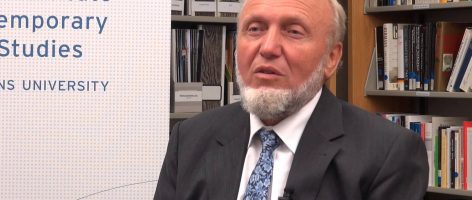Post-Soviet Apprenticeship
After the hustle and bustle of the capital city, our train passed through the countryside. Small family farms with goats abutted a busy railway. Our destination also lay in between …
The French Challenge
The French government recently announced that the age of austerity is finally over—at least for France. That it will now disregard most of its commitments on reducing fiscal deficits represents …
ECB Turning into a “Bad Bank”? Nonsense
Adequate ECB Policy Reduces Risks For five years, many German academics and the mass media have warned that the unconventional policies of the European Central Bank (ECB) would lead to …
Central Banks’ Diverging Paths Equals a Weaker Euro
The latest monetary decisions made by the U.S. Federal Reserve (Fed) and the European Central Bank (ECB) are keeping analysts very busy. The two key questions central bank watchers are grappling …
Safe as Houses: Comparing Housing Finance Policies in the U.S. and Germany
The recent financial crisis demonstrated that housing is a key sector of the U.S. economy, with the potential to bring down the entire global economy. The crisis also recast the …
Recent Authors
AGI provides knowledge, insights, and networks as tools to solve the challenges ahead.
Support Our WorkLabor Mobility
How mobile are workers in the euro currency area? Everyone directly or indirectly involved in devising, designing, and implementing the single European currency had to deal with this question in …
Turning Plans Into Action
About a year ago, markets were experiencing serious taper tantrums. At the time, ECB President Mario Draghi proudly defended the fact that unwinding outright asset purchases, and therefore reducing its …
The European Version of Quantitative Easing
Now set to directly purchase asset-backed-securities, ECB President Mario Draghi is leading the Euro Zone in the opposite path of the U.S. Federal Reserve. AICGS Business & Economics Program Director Alexander Privitera analyzes the impact of the announcement for the Euro Zone.
The Robert Bosch Foundation Fellowship Program
The Robert Bosch Foundation and Cultural Vistas invite US professionals to apply for the 2015-2016 Robert Bosch Foundation Fellowship Program. Bosch Fellows work as consultants in their field of expertise …
Crossing the New Rubicon?
Mario Draghi, the president of the European Central Bank, knows a thing or two about the importance of timing. As markets anxiously wait for new clues from the central banker …

Trading French Reform for German Investment: A Win-Win for Berlin and the Eurozone
As economic growth in Germany falls short and French prospects begin looking up, now is the time for a new Grand Bargain over debt and reform in the Euro Zone. AICGS Non-Resident Fellow Peter Rashish details the impact of French President Francois Hollande’s recent successes in economic reform, including removing left-wing cabinet members from office.





